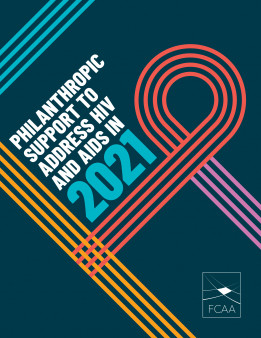Global philanthropic funding in the form of private grants to fight the HIV epidemic dipped $9 million to $692 million between 2020 and 2021, according to the latest annual report from Funders Concerned About AIDS (FCAA).
Although the drop represents a 1% decline in funding, the report authors say it “raises red flags” because “waning support for HIV is not an anomaly…private philanthropic resources for HIV have shown a slow and steady decline in recent years.”
The 2023 report on 2021 data marks the 20th edition of “Philanthropic Support to Address HIV and AIDS,” and it covers a year that commemorated the 40th anniversary of what’s generally considered the start of the epidemic: June 1981, when the Centers for Disease Control and Prevention published its first article about the disease that came to be known as AIDS.
The report includes information on more than 5,000 grants disbursed by 187 funders and awarded to 2,800 grantee organizations. As such, it offers a snapshot of the philanthropic response to the epidemic.
In breaking down the data, the report offers a look at the top funders, where the grants are going and how the money is being used (for example, to promote pre-exposure prophylaxis, or PrEP, to prevent HIV, or to invest in research or administrative costs).
The top five funders of 2021 were Gilead Sciences, the Bill & Melinda Gates Foundation, Viiv Healthcare, Silicon Valley Community Foundation and Wellcome Trust. The top two funders—Gilead and Gates—represented 66% of the global philanthropic resources.
“It is unconscionable that we know how to end the AIDS epidemic but lack the political will and financial investment to do so,” said FCAA executive director Masen Davis in the press release. “It’s time for the public, policymakers and philanthropy to think seriously about what’s at stake. The most vulnerable people around the world are being left behind, and we have the chance to stop it, but the window is narrowing. We must take action now.”







Comments
Comments